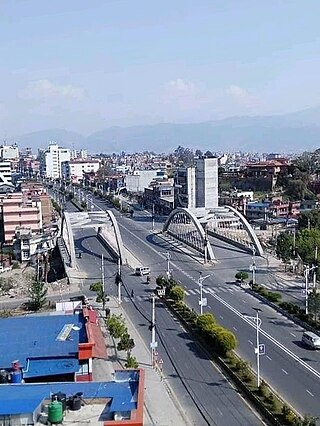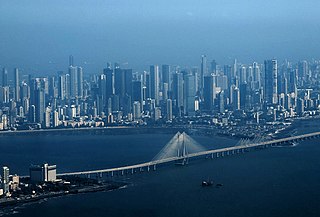Related Research Articles

The economy of Honduras is based mostly on agriculture, which accounts for 14% of its gross domestic product (GDP) in 2013. The country's leading export is coffee (US$340 million), which accounted for 22% of the total Honduran export revenues. Bananas, formerly the country's second-largest export until being virtually wiped out by 1998's Hurricane Mitch, recovered in 2000 to 57% of pre-Mitch levels. Cultivated shrimp is another important export sector. Since the late 1970s, towns in the north began industrial production through maquiladoras, especially in San Pedro Sula and Puerto Cortés.

The economy of Nepal is developing category and largely dependent on agriculture and remittances. An isolated, industrial society until the mid-20th century, Nepal entered the modern era in 1951 without schools, hospitals, roads, telecommunications, electric power, industry, or civil service. The country has, however, made progress toward sustainable economic growth since the 1950s. The country was opened to economic liberalization, leading to economic growth and improvement in living standards when compared to the past. The biggest challenges faced by the country in achieving higher economic development are the frequent changes in political leadership, as well as corruption.

Though the Ministry of Foreign Affairs (MOFA) is the government agency responsible for the conduct of foreign relations of Nepal, historically, it is the Office of Prime Minister (PMO) that has exercised the authority to formulate and conduct policies related to Nepal's foreign affairs. As a landlocked country wedged between two larger and far stronger powers, Nepal has tried to maintain good relations with both of its neighbors, People's Republic of China and Republic of India. Nepal's relationship with China, India, and the United States has remained utmost priority for successive Nepali governments. The relationship between Nepal and India however was significantly hampered during the 2015 Nepal blockade by pro-Indian anti-Nepal protestors, where the Government of Nepal accused India of using "Russia-Ukraine" tactics to cause unrest along Nepal's southern border using ethnically Indian residents of Nepal. India strictly denied the allegation and said the unrest were solely due to Madheshi protesters. For the most part though, Nepal has traditionally maintained a non-aligned policy and enjoys friendly relations with its neighboring countries and almost all the major countries of the world.

The economy of Tajikistan is dependent upon agriculture and services. Since independence, Tajikistan has gradually followed the path of transition economy, reforming its economic policies. With foreign revenue precariously dependent upon exports of cotton and aluminium, the economy is highly vulnerable to external shocks. Tajikistan's economy also incorporates a massive black market, primarily focused on the drug trade with Afghanistan. Heroin trafficking in Tajikistan is estimated to be equivalent to 30-50% of national GDP as of 2012.
A free-trade zone (FTZ) is a class of special economic zone. It is a geographic area where goods may be imported, stored, handled, manufactured, or reconfigured and re-exported under specific customs regulation and generally not subject to customs duty. Free trade zones are generally organized around major seaports, international airports, and national frontiers—areas with many geographic advantages for trade.

An industrial park is an area zoned and planned for the purpose of industrial development. An industrial park can be thought of as a more "heavyweight" version of a business park or office park, which has offices and light industry, rather than heavy industry. Industrial parks are notable for being relatively simple to build; they often feature speedily erected single-space steel sheds, occasionally in bright colours.

The economy of India has transitioned from a mixed planned economy to a mixed middle-income developing social market economy with notable state participation in strategic sectors. It is the world's fifth-largest economy by nominal GDP and the third-largest by purchasing power parity (PPP). According to the International Monetary Fund (IMF), on a per capita income basis, India ranked 139th by GDP (nominal) and 127th by GDP (PPP). From independence in 1947 until 1991, successive governments followed Soviet style planned economy and promoted protectionist economic policies, with extensive state intervention and economic regulation. This is characterised as dirigism, in the form of the Licence Raj. The end of the Cold War and an acute balance of payments crisis in 1991 led to the adoption of a broad economic liberalisation in India. Since the start of the 21st century, annual average GDP growth has been 6% to 7%. The economy of the Indian subcontinent was the largest in the world for most of recorded history up until the onset of colonialism in early 19th century. India account for 7.2% of global economy in 2022 in PPP terms, and around 3.4% in nominal terms in 2022.

Nepali tea is a beverage made from the leaves of tea plants grown in Nepal. They are distinctive in appearance, aroma and taste, but are similar in many ways to tea produced in Darjeeling tea, perhaps because the eastern zones of Nepal have geography and topography similar to Darjeeling. Its relatively smaller production quantities mean that teas from Nepal are less well known than those from Darjeeling.

Maharashtra Industrial Development Corporation (MIDC) is a project of the government of Maharashtra state in India and is the leading corporation of Maharashtra. It provides businesses with infrastructure such as land, roads, water supply, drainage facilities and street lights. Dr. Vipin Sharma, IAS, is the CEO of MIDC Maharashtra Industrial Development Corporation.

Suresh Prabhakar Prabhu is an Indian politician, and Chancellor of Rishihood University who was the Minister of Civil Aviation, Railways, Commerce & Industry in the First Modi ministry.

The Ministry of Commerce and Industry administers two departments, the Department of Commerce and the Department for Promotion of Industry & Internal Trade. The head of the Ministry is a Minister of Cabinet rank.

India–Nepal relations are the bilateral relations between India and Nepal. Both countries initiated their relationship with the 1950 Indo-Nepal Treaty of Peace and Friendship and accompanying secret letters that defined security relations between the two countries, and an agreement governing both bilateral trade and trade transiting Indian territory.
Trade is a key factor of the economy of China. In the three decades following the dump of the Communist Chinese state in 1949, China's trade institutions at first developed into a partially modern but somewhat inefficient system. The drive to modernize the economy that began in 1978 required a sharp acceleration in commodity flows and greatly improved efficiency in economic transactions. In the ensuing years economic reforms were adopted by the government to develop a socialist market economy. This type of economy combined central planning with market mechanisms. The changes resulted in the decentralization and expansion of domestic and foreign trade institutions, as well as a greatly enlarged role for free market in the distribution of goods, and a prominent role for foreign trade and investment in economic development.

The Ministry of Economic Affairs is the ministry of the Republic of China (Taiwan) responsible for formulating policy and laws for industry and trade, foreign direct investment, energy, minerals, measurement standards, intellectual property, state-owned enterprises. The ministry is a cabinet level government agency of the Executive Yuan.

Foreign trade of the United States comprises the international imports and exports of the United States. The country is among the top three global importers and exporters.

The Ministry of Investment, Trade and Industry, abbreviated MITI, is a ministry of the Government of Malaysia that is responsible for international trade, industry, investment, productivity, small and medium enterprise, development finance institution, halal industry, automotive, steel, strategic trade. The ministry has its headquarters located at Menara MITI on Jalan Sultan Haji Ahmad Shah in Kuala Lumpur and the building is also a component of Naza TTDI’s 75.5-acre KL Metropolis, a mixed development that is envisioned to be the International Trade and Exhibition District for Kuala Lumpur. It is one of the three ministries that has not moved to Putrajaya.

The Nepalese Ministry of Minister of Industry, Commerce and Supplies is a governmental body of Nepal to monitor and manage industries of the country.

Philippine Economic Zone Authority (PEZA), formerly known as Export Processing Zone Authority (EPZA), is a government agency in the Philippines attached to the Department of Trade and Industry created to help promote investments in the export-oriented manufacturing industry into the country by assisting investors in registering and facilitating their business operations and providing tax incentives. PEZA also assists investors who locate in service facilities inside selected areas in the country which are usually business process outsourcing and knowledge process outsourcing firms. Other activities also eligible for PEZA registration and incentives include establishment and operation within special economic zones for tourism, medical tourism, logistics and warehousing services, economic zone development and operation and facilities providers.
In the 21th century, the economy of Turkey has prospered thanks to a long period of steady economic growth, well above the average of the 1990s. It has become one of the world's emerging economies and one of the fastest growing countries in the world with a strong industrial base caused by an economic boom in the 2000s. In addition, Turkey's economic situation was relatively prosperous during the 2008 global financial crisis. The Turkish government has developed a series of macroeconomic policies in accordance with the new economic plan and the Turkish government has used the new government structure and cooperated with the International Monetary Fund, which has led to some good effects, including reducing the unemployment rate, higher education level, and increasing life expectancy. As a result, real GDP growth made Turkey one of the fastest growing countries in the 2000s. Turkish geopolitical strategy and geography are extremely important as it is the crossroads connecting Europe and Asia. Turkey is a founding member of the Organization of Economic Cooperation and Development, a member of the G20 and the NATO, and a candidate for the European Union.
References
- 1 2 Zhongming, Zhu; Wangqiang, Zhang; Wei, Liu (2019). "Macroeconomic Update: Nepal (September 2019)".
{{cite journal}}: Cite journal requires|journal=(help) - ↑ "Six years on, Nepal's first economic zone struggles to find investors" . Retrieved 2021-12-08.
- 1 2 Gyanwali, Gokarna Prasad (2020). "Special Economic Zones (SEZ): Challenges and Opportunities in Nepal". Research Nepal Journal of Development Studies. 3 (2): 49–61. doi: 10.3126/rnjds.v3i2.34481 . ISSN 2631-2131. S2CID 234402940.
- ↑ "Special Economic Zone (First Amendment) Act 2075: A Review Neftake". NEF. 2019-05-22. Retrieved 2021-12-08.